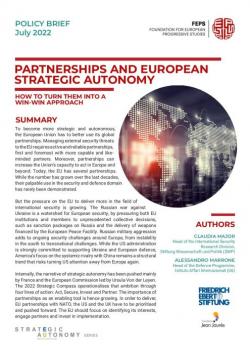Partnerships and European strategic autonomy: How to turn them into a win-win approach

To become more strategic and autonomous, the European Union has to better use its global partnerships. Managing external security threats to the EU requires active and reliable partnerships, first and foremost with more capable and like-minded partners. Moreover, partnerships can increase the Union’s capacity to act in Europe and beyond. Today, the EU has several partnerships. While the number has grown over the last decades, their palpable use in the security and defence domain has rarely been demonstrated. But the pressure on the EU to deliver more in the field of international security is growing. The Russian war against Ukraine is a watershed for European security, by pressuring both EU institutions and members to unprecedented collective decisions, such as sanction packages on Russia and the delivery of weapons financed by the European Peace Facility. Russian military aggression adds to ongoing security challenges around Europe, from instability in the south to transnational challenges. While the US administration is strongly committed to supporting Ukraine and European defence, America’s focus on the systemic rivalry with China remains a structural trend that risks turning US attention away from Europe again. Internally, the narrative of strategic autonomy has been pushed mainly by France and the European Commission led by Ursula Von der Leyen. The 2022 Strategic Compass operationalises that ambition through four lines of action: Act, Secure, Invest and Partner. The importance of partnerships as an enabling tool is hence growing. In order to deliver, EU partnerships with NATO, the US and the UK have to be prioritised and pushed forward. The EU should focus on identifying its interests, engage partners and invest in implementation.
-
Details
in FEPS Policy Briefs, July 2022, 24 p.
Introduction
1. Strategic autonomy in security and defence: partners as an enabling dimension
2. Current state of partnerships: numerous, but fragemented and with little direction
3. Prospects and tendencies in co-operation: pragmatism ahead
4. The way forward for partnerships
Conclusion
Bibliography
About the authors


